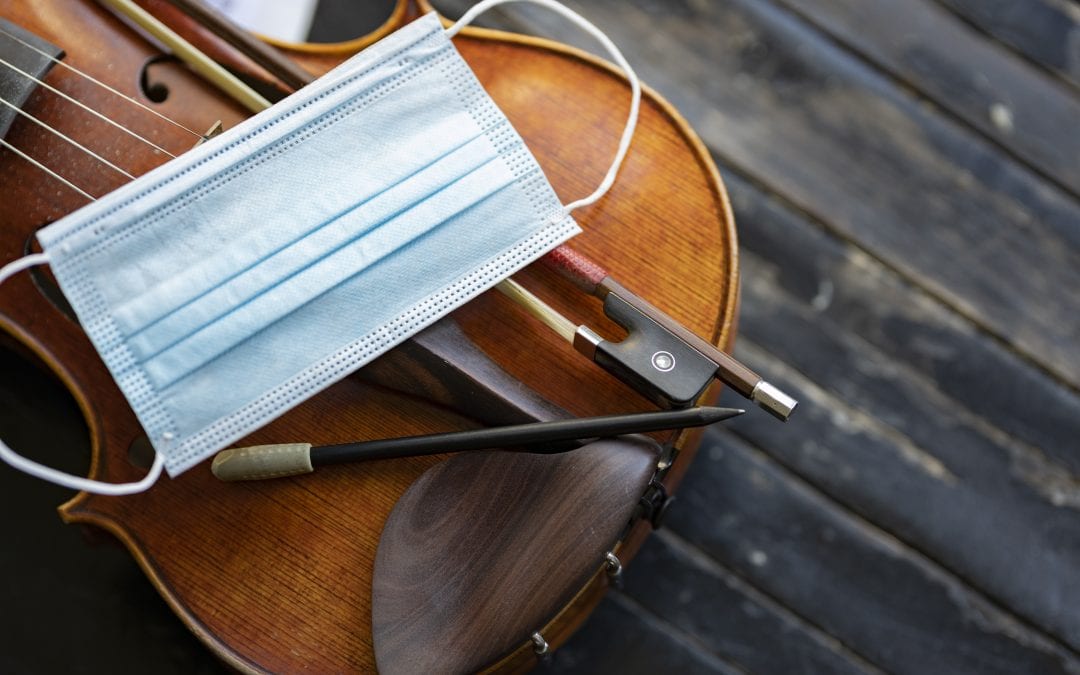For more information contact claire.cordeaux@bapam.org.uk
As lockdown eases and students and professionals start to return to work and study, institutions will need, in addition to their health and safety responsibilities, to assess the level of fitness to work and practise of their students, performers and staff. The Society of Occupational Medicine (SOM) recommends that “risk assessments should link clinical vulnerability to specific workplace risks”. Occupational health specialists are best placed to undertake risk assessments for individual workers, given the required confidential medical knowledge.
In the performing arts, there are additional considerations to be addressed in risk assessing return to work or study. The UK Government have issued specific guidance for the performing arts sector: https://www.gov.uk/guidance/working-safely-during-coronavirus-covid-19/performing-arts
Performance is often a group activity which requires close proximity to other performers, and singers, actors, brass and woodwind players generate aerosols which can increase COVID-19 transmission rates. Musical instruments should not be shared, and there is advice on cleaning instruments from the National Federation of State High Schools/NAMM in the US.
Mental health issues: Early research shows that many returners are going to return with depleted mental health and an ongoing risk of mental health problems. Performers may be concerned about the future of the performing arts industry, finances, bereavement, and anxiety related to the fear of COVID-19. Mentally healthy work and study places will be a priority as lockdown eases and the SOM advice is that there will be a need to focus on support, maintenance and prevention.
Post-COVID-19 sequelae: Individuals who have had the virus may have additional complications which affect their ability to practise and perform. Voice-users, for example, are advised to recuperate for 6-8 weeks after the virus to allow recovery. Advice from sports medicine is highly relevant to performers who are athletes themselves. Published in the Lancet, this article suggests resting for two weeks after the start of symptoms and getting back to playing slowly, seeking medical help if things don’t improve. JAMA Medical indicates 1% of COVID-19 survivors develop a heart problem and further diagnostics and treatment may be needed. Common aftereffects of COVID-19 include fatigue, prolonged cough and for some there may be long-term lung damage, kidney damage and blood clotting. Those patients who have been in ICU will need physical and emotional rehabilitation.
Fitness to practise or perform: Performing artists will have had differing opportunities to practise whilst in lockdown. Shared accommodation space and lack of specialist equipment may not have allowed the opportunity to create or practise. Conversely, some performers may have been over-practising during this period. All performers will have had their normal practice routines affected during lockdown and are at risk of musculoskeletal problems such as overuse injuries as they return to previous activity levels.
Vulnerability to COVID-19: Some individual students or performers are more at risk of serious illness than others, should they contract COVID-19. Underlying health conditions, age, gender, ethnicity and socioeconomic factors may all be relevant in an individual’s risk assessment.
Performing Arts Occupational Health – post COVID-19: BAPAM is the largest provider of performing arts medicine in the UK, covering all four nations, and has over 200 practitioners from different clinical disciplines who specialise in working with performing artists. We can offer support to organisations in the performing arts who are planning for return to work or study, in the following areas:
1. Education and intervention around physical and psychological wellbeing including self-management techniques. BAPAM’s public training programmes are online and available to all performing arts workers and students. We can also provide bespoke training to organisations.
2. We have published FAQs for performers/students on returning to work and a Risk Assessment for freelance performing arts workers, which can also be used by individual students or staff for self-administration to help them identify any health issues relevant to Covid-19 vulnerability.
3. Formal Occupational Health assessment, with onward referral and collaboration where additional specialist input is required, for example for musculoskeletal, cardiopulmonary, psychological, or vocal issues. This includes advice to institutions or employers on the vulnerability of individual performers or students, to inform risk assessments, and suggestions as to how these individuals may be further protected by restricting particular activities or environments. Reporting is always with patient consent.
4. A policy on workplace COVID-19 management e.g. identifying and managing symptomatic individuals in the workplace, testing, self-isolation and post-infection return to work recommendations. RIDDOR reporting is required if the virus is deemed to be contracted in the workplace/educational institution.
For more information contact claire.cordeaux@bapam.org.uk
Related return to work information:

